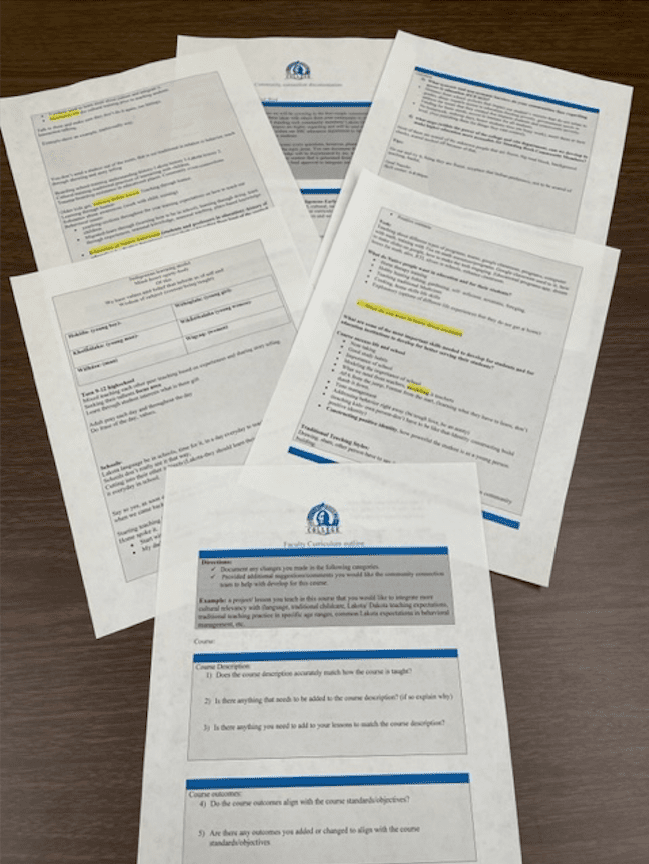By Dr. Chris Fried, Professor and Co-Project Director and Dr. Derek Stewart, Professor and Co-Project Director

Faculty audit forms and community connection documents.
The Sitting Bull College early childhood education program was awarded the Ihduwiyayaypi: Advancing Indigenous Early Childhood Education grant from the American Indian College Fund in May of 2022. The early childhood program at Sitting Bull College includes an Associate of Science and a Bachelor of Science in early childhood. Students who complete the programs are qualified to teach and work with children from birth to age 8 and can acquire their North Dakota state teaching license for these ages. Sitting Bull College also offers a Bachelor of Science in elementary education and Bachelor of Science in secondary science education which lead to licensure in the state of North Dakota.
The goals of the Ihduwiyayapi grant for Sitting Bull College are three-fold, the first of which is to identify barriers that prevent students from attending courses and completing programs. The second goal of the grant is to review current curriculum in the early childhood program and align cultural and language standards for each course. Lastly, the grant will create a community connection team with elders, teachers, students, and faculty to contribute to the program curriculum and review curriculum assessments and data.
Sitting Bull College faculty have reviewed and audited the courses in the early childhood program and identified areas of strength and weakness that have been shared with the community connection team.
Beginning in the fall of 2022, the faculty in the teacher education department reviewed all courses in the early childhood program to determine if coursework was culturally relevant and if activities and projects need to include more cultural relevancy. In this review, if faculty felt there were courses where guidance was needed in integrating culturally relevant projects and activities, they indicated that, and it became part of the discussion and work in the community connection team meetings.
Matching game musical instruments in Lakota. Click to view the PDF.
Dr. Derek Stewart gathered community connection team members, including elders, teachers, and students, on four different occasions during the 2022-2023 academic year. In these team meetings, the members reviewed and provided suggestions and ideas for activities that integrated culture and language into program curriculum. Community team members also worked together to provide perspectives on the needs of early childhood education in Standing Rock, what parent/family engagement and empowerment should look like, and what barriers community members face regarding access to higher education.
Data from the community connection team meetings is being reviewed and analyzed over the summer months by faculty members and will be integrated into coursework that is offered in the fall of 2023. Included in this blog is an example of an assignment looking at traditional musical instruments, along with several contemporary instruments, where students have to match the instrument to the Lakota term. These types of activities will help strengthen the connection for our early childhood students, the language and culture, and their ability to integrate Lakota Language and Culture in their future classroom!
Photo 1: Faculty audit forms and community connection documents.
Photo 2: Matching game musical instruments in Lakota.
